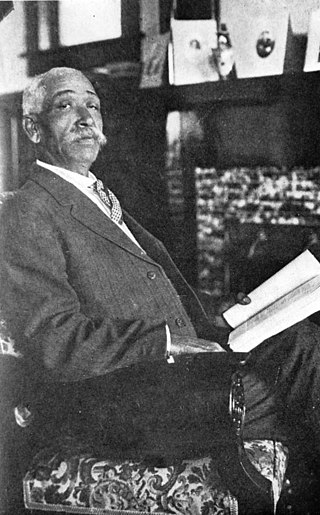Related Research Articles

Joseph Newman Clinton was a politician and public official in Florida. An African American, he served in the Florida House of Representatives from Alachua County from 1881 to 1883, was a member of the city council in Gainesville from 1883 to 1885, and was a federal official in Pensacola and Tampa.
Alfred Brown Osgood was an American legislator and Christian minister in Florida.
William Bradwell was a religious leader and Reconstruction era politician in Florida. He lived in Jacksonville and represented Duval County in the Florida Legislature. An African American, he was a leader in the A.M.E. Church. He served in the Florida Senate representing Duval County, Florida from 1868 to 1870. He was a Republican and stated that his father was "one of the first representatives to the Legislature of Georgia".
Frederick Hill was an African-American politician in Florida during the Reconstruction era. He was a delegate to the 1868 Florida Constitutional Convention and represented Gadsden County in the Florida Legislature. He also served as a Gadsen County Commissioner and was the postmaster in Quincy, Florida for several years.
William U. Saunders was a barber and lawyer who represented Gadsden County, Florida, in the Florida Legislature during the Reconstruction era.
Samuel Spearing served in the Florida Senate during the Reconstruction era. He represented Duval County in the state senate in 1874. According to one source he was known as Uncle Sam. He also served as a collector of revenue.
Dernard E. Quarterman was an American Christian minister and politician.
Benjamin F. Livingston was a politician, grocer, and brick mason in the United States. An African American, he was born into slavery. After emancipation, he was appointed a County Commissioner for Jackson County, Florida, serving from 1868 until 1870. He served from 1871 until 1875 in the Florida House of Representatives representing Jackson County, Florida during the Reconstruction era. While there he voted for a civil rights bill in 1873.
The Independent Party was a political party formed in Florida in the wake of schisms between African Americans and northerners who came south after the American Civil War and became involved in Florida politics during the Reconstruction era. It also sought to appeal to disaffected Democrats.
Daniel C. Martin was a state legislator in Florida. He represented Alachua County in the Florida State Senate in 1885 and 1887. He lived in the 13th District in Gainesville. A photo of him with other legislators is held in the Florida Archives. He was one of the last African Americans to serve in the state senate.
Richard Horatio Black was a soldier, teacher, Volusia County registrar, justice of the peace, member of the Florida House of Representatives and held a custom house position in Philadelphia. He was a member of the state house representing Alachua County, Florida in 1869 and 1870,
Birch Gibson was a state legislator and local official in Ocala, Florida. He was one of several African Americans to represent Marion County, Florida in the Florida House of Representatives during the Reconstruction era in 1872. He was elected in 1873. He served as on the Ocala City Council, in the state House, and as a justice of the peace.
Noah Graham was an A.M.E. minister and state legislator in Florida. The Florida Archives have a copy of his 1867 voter registration. He is identified as "Colored". He represented Leon County, Florida in the Florida House of Representatives from 1868 to 1872. In 1868 he was also a Leon County Commissioner when Lieutenant Governor William Henry Gleason assumed the governor's office made various appointments and a dispute ensued. Graham resigned as commissioner when order was restored. A leader in the Republican Party, he tried to mediate an 1870 state senate election campaign dispute between Republican Party rivals James Page's Baptist and conservative supporters and Charles H. Pearce's A.M.E. and Radical Republican faction. Pearce prevailed.
Samuel W. Frazier was a farmer, justice of the peace and state legislator in Florida. He was elected to several terms in the Florida House of Representatives from Leon County.
Mark S. White was a teacher and politician in Florida. He lived in Pensacola and represented Escambia County, Florida in the Florida House of Representatives in 1883. He belonged to the Knights of Labor. He was described as "mulatto".
Robert H. Dennis Sr. was a teacher and state legislator in Florida. In 1875 he represented Jackson County, Florida in the Florida House of Representatives.
William F. Thompson was a lawyer, law school teacher, justice of the peace, tax assessor, state legislator, and delegate to Florida's 1885 Constitutional Convention.
John Sunday Jr. was a carpenter, merchant, mechanic, cotton inspector, and state legislator in Florida. He served with fellow African American Charles Rouse representing Escambia County, Florida in 1874. He also served as a councilman in Pensacola.
Auburn H. Erwin was an American teacher, A.M.E. minister, justice of the peace, constable, and state legislator in Florida. He was a delegate to the 1868 Florida Constitutional Convention and represented Columbia County, Florida in the Florida House of Representatives from 1868-1870. He was a constable in Duval County in 1872 and in 1878 and 1879. He served as a justice of the peace for Duval County in 1873 and 1874.
Robert Cox was a state legislator in Florida. He was from Alabama and moved to Florida before the American Civil War. He represented Leon County, Florida in the Florida House of Representatives from 1868-1870. He owned substantial property and had a son Benjamin who was a post office route agent.
References
- 1 2 Florida's Black Public Officials, 1867 - 1924 by Canter Brown Jr. University of Alabama Pres (1998) page 141
- 1 2 Dickerson, Dennis C. (December 1, 2010). African American Preachers and Politics: The Careys of Chicago. Univ. Press of Mississippi. ISBN 9781604734287 – via Google Books.
- ↑ Brown, Canter (January 23, 1998). Florida's Black Public Officials, 1867-1924. University of Alabama Press. ISBN 9780817309152 – via Google Books.